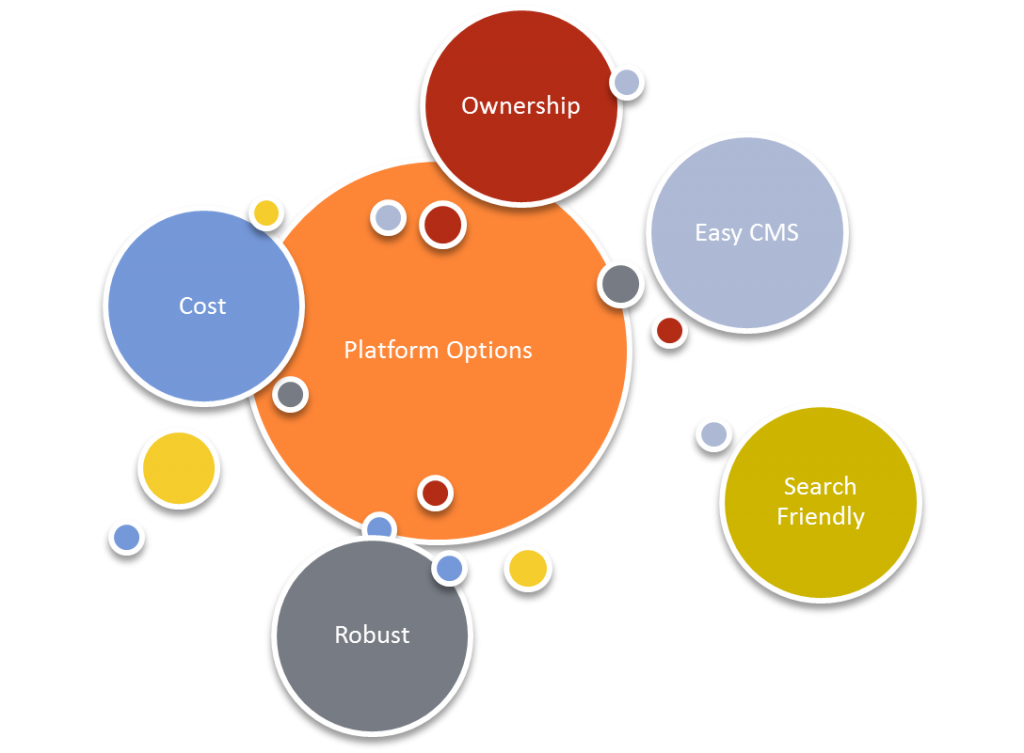 There are a lot of blogging platforms out there. A lot! Blogging is a powerful medium for communication, relationship building and social media strategy, so it makes sense that there are many platform options to choose from. While most blogging platforms will work for most bloggers on a pretty basic level, jumping on the first blogging platform you run across may be bad for your long-term blogging strategy.
There are a lot of blogging platforms out there. A lot! Blogging is a powerful medium for communication, relationship building and social media strategy, so it makes sense that there are many platform options to choose from. While most blogging platforms will work for most bloggers on a pretty basic level, jumping on the first blogging platform you run across may be bad for your long-term blogging strategy.
And if you don’t have a long-term blogging strategy today, you might have one tomorrow and find out the blogging you did yesterday wasn’t on a platform compatible for the future. So think ahead and try to keep up.
Five Important Blogging Platform Questions
Most of the blogging platforms out there are pretty similar with some minor variations. But there are a few key things that you need to pay attention to in order to ensure you’re using a platform that works for your long-term goals.
It really all comes down to the options each platform provides and whether or not those options matter to you when looking at the bigger picture. Here are five questions you need to ask about any platform you are considering:

How robust is it?
Some blogging platforms are pretty light and simple. Which works great for hobby bloggers that really don’t have an eye on becoming rich and famous for their clever wit and insightful insights.
But those of you blogging for business or looking to gain followers might want to pay attention to the power of the platform the blog is sitting on. You may not need every option available now – or ever for that matter – but there may be options that you’ll need as you continue to grow your blog base and capabilities.
Does it have an easy-to-use CMS?
Most blogging platforms come with a decent enough content management system (CMS). For those that don’t understand what a CMS does, it really boils down to not having to mess with HTML code to add text, images, change fonts, etc.
Most CMS systems offer the basics such as bold, underline, italic, font size and a few other styling options. That may be enough for you, but others want more easy-to-use options, such as switching between visual and code view, inserting tables, highlighting text, editing images and so on. The more options available in the CMS, the more you can to make your content visually appealing.
Is it search engine friendly?
This is one of the most important aspects of choosing a blogging platform for those of us who care about having more than two readers! Getting your content found is important for driving traffic and building an audience. On search friendly (and interesting) blogs, search engines are usually the primary traffic driver to individual blog posts.
Blogging platforms that are not search engine friendly are missing a key component for traffic delivery. While search engines may drive some traffic, a non-search friendly blog will be seriously impaired at giving the search engines what they need to value the content of the blog.
Who owns your content?
Ownership of the blog content is critical to every successful blogger. The issue isn’t so much about who owns the words, but who owns the ability to control the words. That control should belong to the blogger.
Some blog platforms can, and do, censor bloggers they feel produce certain types of content. While this isn’t necessarily a bad thing, it can lead to getting censored because you have an opinion that is deemed unacceptable to the masses. Ownership determines whether or not you have a right to say what you want to say and how you want to say it without worrying about censorship.
Another aspect to the ownership is being able to take the content and the value of your content with you to a new platform whenever you choose. Some platforms don’t allow you to export your content easily or, more importantly, set up redirects to make sure your visitors find you at your new home.
How much does it cost?
Cost can be a significant factor, especially for bloggers who are just getting started. If you’re unsure about your long-term blogging future, then you’ll be tempted to go with a free option. If you’re a bit more serious about blogging, you might want to look into something that is paid but gives you more of what you like.
Keep in mind, just because something costs money doesn’t mean it is better than a free version. And just because something is free doesn’t mean it won’t give you everything you need. Paid platforms sometimes are more about ease of use or the community that goes with them.
The cost of blogging is more than just dollars; it’s also time, energy and the effort you have to put in above and beyond the actual blogging. Blog management is critical and leaving that to someone else may be worth its weight in gold.
Asking (and answering) these five questions will arm you with the information you need to select the best blogging platform for your needs. Better to go in informed and knowing these answers than jumping into something that isn’t going to be your long-term blogging partner. The headache created in such a divorce may not be worth it, especially because you can do your vetting beforehand.

One Response to Five Questions You Need To Ask Before Selecting a Blogging Platform